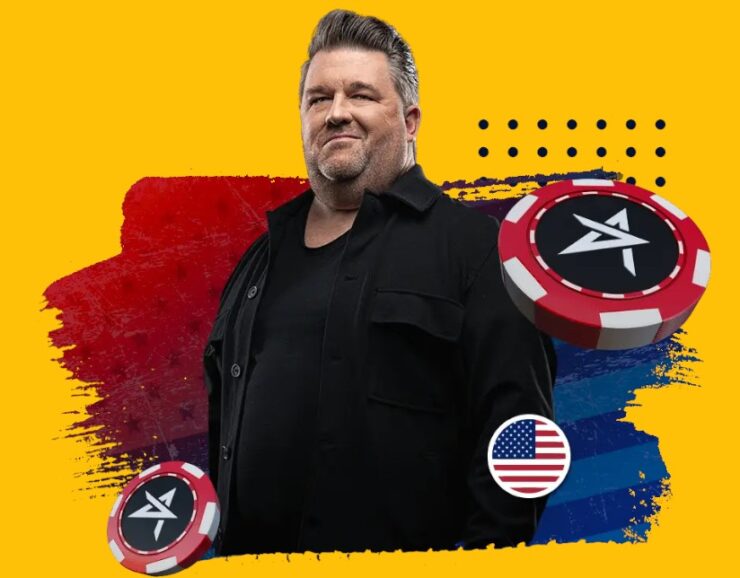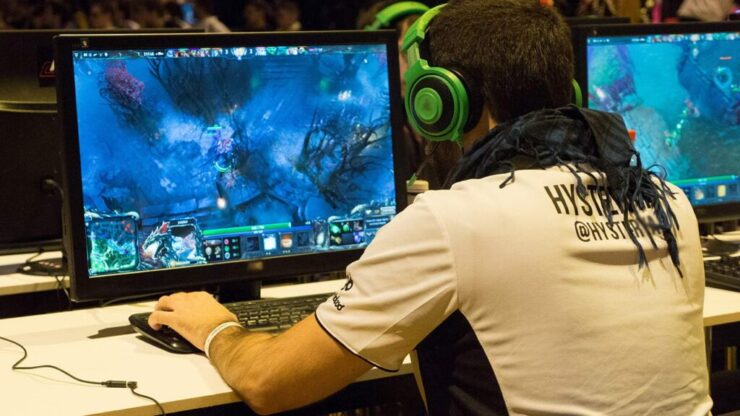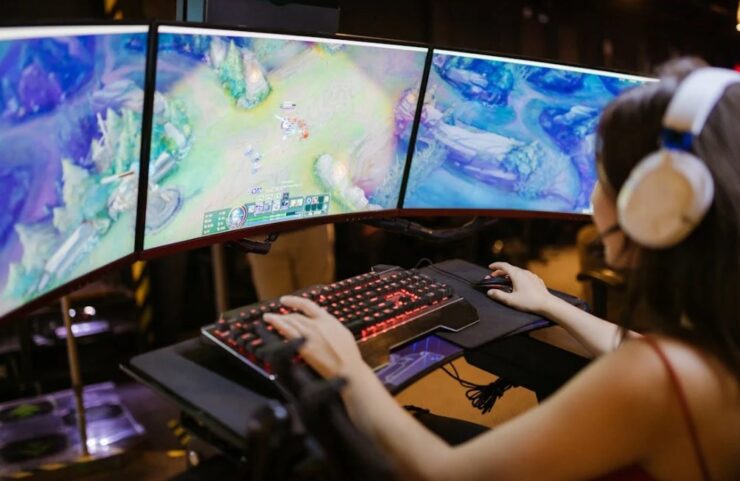We’ve all been there. You’re getting absolutely demolished in your favorite game, and you can’t figure out why that 12-year-old keeps headshotting you from across the map. The truth is, getting better at online gaming isn’t just about having the fanciest RGB keyboard or the most expensive headset (though they don’t hurt).
Whether you’re a weekend warrior or someone seriously thinking about going pro, these strategies will actually make a difference. I’ve seen players go from complete noobs to genuinely competitive just by focusing on these fundamentals.
1. Practice with Purpose (Not Just Grinding)

Mindlessly playing for 8 hours straight won’t make you better. It’ll just make you tired and probably pretty frustrated.
Instead, treat each session like you’re training for something specific. Let’s say you’re playing Counter-Strike. Don’t just jump into matchmaking and hope for the best. Spend 20 minutes in aim_botz working on your crosshair placement. Then maybe 15 minutes practicing spray patterns on the recoil master map.
Set actual goals. “I want to hit 80% headshots in aim training today” is way better than “I’ll just play until I get better somehow.” Trust me, your future self will thank you when you’re not stuck in the same rank six months from now.
2. Actually Understand How the Game Works
This might sound obvious, but you’d be shocked at how many players skip this part entirely. Every game has its own weird quirks and systems that aren’t immediately obvious.
Take League of Legends, for example. You could play for months without really understanding how ability power scaling works, or why certain champions spike at level 6 while others need three items to be useful. But once you get these concepts, they’ll be a game-changer.
Don’t just rely on tooltips either. Hit up YouTube, browse Reddit guides, and watch how the pros handle different situations. The more you understand the “why” behind good plays, the better your decision-making becomes when things get hectic.
3. Keep Your Head in the Game
Gaming can be brutal on your mental state. One bad streak and suddenly you’re questioning everything about your life choices.
The players who actually improve long-term have figured out how to bounce back from losses without tilting into oblivion. They treat mistakes as data points, not personal attacks on their character.
This is where community really helps. Places like Americas Cardroom have players who’ve been through the same struggles and can offer perspective when you’re feeling stuck. Sometimes you just need someone to remind you that everyone has bad days.

4. Review Your Replays (Even the Embarrassing Ones)
Nobody likes watching themselves fail, but this is where the magic happens. Record your games and actually watch them back, especially the ones where you got completely outplayed.
You’ll start noticing patterns. Maybe you always peek from the same angle and get punished for it. Or perhaps you’re making the same positioning mistake over and over without realizing it.
Most games have built-in replay systems now, so there’s really no excuse. And if you can find someone better than you to review your gameplay, even better. Fresh eyes catch things you’ll miss every time.
5. Don’t Go It Alone
The gaming community gets a bad rap sometimes, but there are genuinely helpful people out there who want to see others improve.
Jump into Discord servers, participate in forum discussions, maybe even attend local tournaments if that’s your thing. You’ll pick up strategies and tricks that you’d never discover playing solo.
Plus, having people to play with makes the whole experience way more enjoyable. And when you’re having fun, you tend to learn faster.
6. Track Your Progress the Smart Way
Once you’ve got your routines down, start tracking your progress in measurable ways. Improvement in gaming can be subtle and easy to overlook if you’re not documenting it. Even something as simple as keeping a small notepad or Google Doc with stats, personal goals, and notes about what went right or wrong in a match can help you see trends over time.
For instance, if you play Valorant, jot down your average combat score and kill/death ratio every week. Are you landing more first kills? Are your retakes improving? If you’re a MOBA player, maybe track your creep score at 10 minutes, ward placements, or kill participation. Over time, these numbers will tell you whether your current strategies are actually working or if it’s time to change your training focus.
A lot of players underestimate how much psychological motivation comes from seeing quantifiable growth. When you can look back and say, “I used to miss half my shots from long range, and now I’m hitting 70%,” it reinforces your commitment to keep pushing forward.
7. Stay Updated on Meta Shifts
Online games evolve. Balance patches, new maps, and item changes can completely shift what strategies work and what don’t. Staying current with patch notes and developer updates might not sound exciting, but it separates strong players from those who suddenly can’t win because “everything feels different.”
If you’re playing Apex Legends, one patch could buff a weapon that was previously useless or nerf a character you’ve been maining for months. Knowing what’s changing before you log in keeps you adaptable.
Follow official game channels, esports analysts, and pro players on social media. You’ll start to recognize how trends form, which tactics are becoming outdated, and where new opportunities are emerging. Being flexible enough to switch playstyles or gear setups when the meta shifts will keep you relevant and competitive.
8. Optimize Your Setup
Skill development is the core of improvement, but your setup still matters. A stable frame rate, proper screen settings, and ergonomic gear can prevent fatigue and give you consistency. Make sure your mouse sensitivity is comfortable and uniform across games if possible. Calibrate your monitor so that brightness and contrast help you see enemies clearly without eye strain.
A clean workspace also makes a surprising difference. When your desk is clutter-free, your mental focus improves. Consider a wrist rest or better chair support if you’re putting in long hours. Physical comfort translates directly to mental endurance, which is crucial for maintaining performance deep into long gaming sessions or tournaments.
9. Balance Grind and Rest
There’s a fine line between dedication and burnout. It’s easy to think that nonstop practice equals faster improvement, but your brain (and reflexes) need rest. Sleep, exercise, and regular breaks actually consolidate learning. When you step away from the screen after an intense match or training block, your mind continues processing what happened.
Even the best esports athletes schedule downtime. Watch any pro bootcamp footage and you’ll notice structured training blocks rather than endless sessions. Try a rhythm that mixes focused drills, review time, and off-hours relaxation. Your mechanics will sharpen more effectively when your mind is refreshed instead of overloaded.
10. Keep Perspective
At the end of the day, gaming is still supposed to be enjoyable. Improvement feels great, but if you start associating every loss with failure, you’ll burn out fast. Learn to celebrate progress, no matter how small. Maybe you still lost the match, but you won two clutch fights you would’ve lost last week. That’s growth.
Remember that every pro player, streamer, or content creator you admire has gone through the same grind, frustration, and self-doubt. What separates them is consistency and resilience. Keep showing up, keep refining, and stay connected to why you love the game in the first place.
Improvement doesn’t happen in one dramatic leap; it builds layer by layer through focused effort, smart adjustments, and patience. If you stick with it, your skills will evolve naturally, and before long, you’ll be the one pulling off plays that leave everyone else wondering how you did it.
The Bottom Line

Getting better at games isn’t rocket science, but it does require some intentionality. Focus on these areas consistently, and you’ll start seeing real improvement in your gameplay. Just don’t expect overnight miracles, even the pros started somewhere.

